The Dirt On Rare Earth

From the New York Times to TTAC, the news is racing around the globe that China put an “embargo” on dirt. Well, it’s rare dirt, also known as Rare Earth. Why should we care about that? As the New York Times lectured us a month ago, the stuff is vital to “rangefinders on the Army’s tanks, sonar systems aboard Navy vessels and the control vanes on the Air Force’s smart bombs.” Whoa, we are a car site! Ok, rare earths “are also used in small steering control motors in conventional gasoline-powered cars as well as in motors that help propel hybrid cars like the Toyota Prius,” says the New York Times, bringing us back on topic. And what is the fuss about?
If the New York Times is to be believed, “China mines 95 percent of the world’s rare earth elements.” After allegedly diddling with rare earth shipments to Japan (it later turned out that China pretty much diddled with all shipments on anything to Japan, while Japan diddled with the captain of one of their trawlers. China went by the customs book for a while to get their point across), China “has now quietly halted some shipments of those materials to the United States and Europe,” said the NYT yesterday.
The NYT made dire predictions when Japan was allegedly singled out: “The export halt is likely to prompt particular alarm in Japan, which has few natural resources and has long worried about its dependence on imports. The United States was the main supplier of oil to Japan in the 1930s, and the imposition of an American oil embargo on Japan in 1941, in an effort to curb Japanese military expansionism, has been cited by some historians as one of the reasons that Japan subsequently attacked Pearl Harbor.” Hadn’t we always thought it was a sneak attack, out of the blue? Well, there is some truth to this: Trade wars and embargoes often are the precursor of shooting wars. Just this time, Japan in unlikely to attack Quingdao.
There is one item which the Times, and all the other papers that crib from the article forgot to tell us:
China should have stopped all Rare Earth shipments to anywhere in the world more than a month ago. Coincidentally, before they diddled with exports supposedly because of a fishing trawler. China has a quota for rare earth exports. In 2010, the quota is 30,300 tonnes. Chinese statistics indicate that by the end of August, exports reached 28,500 tonnes, leaving about 2,000 tonnes. China should have said “that’s it, no more rare earth, come back next year.”
Quotas, be it for import or for export, are quite common in the business. The Department of Homeland Security has a handy website, titled “Are My Goods Subject to Quota?” China has to contend with a long list of quotas in the textile industry alone. If you want to order Chinese t-shirts, order early in the year. And it is no surprise that in the last quarter of the year, textile exports from places like Mongolia or Myanmar suddenly spike. World trade is a maze (or a maize) of quotas.
Yesterday, the NYT admitted that “despite their name, most rare earths are not particularly rare. But most of the industry has moved to mainland China over the last two decades because of lower costs and steeply rising demand there as clean energy industries have expanded rapidly.”
That the Chinese have a stranglehold on rare earth is not because they are the only ones who are are sitting on it. It’s due to laziness and lack of money. Even the NYT has to admit:
Until spring, it seemed that China’s stranglehold on production of rare earths might weaken in the next three years — two Australian mines are opening with combined production equal to a quarter of global output.
But both companies developing mines — Lynas Corporation and smaller rival, Arafura Resources — lost their financing last winter because of the global financial crisis. Buyers deserted Lynas’s planned bond issue and Arafura’s initial public offering.
Mining companies wholly owned by the Chinese government swooped in last spring with the cash needed to finish the construction of both companies’ mines and ore processing factories.
As long as China was doing the dirty work (and it is dirty to mine rare earth) at a low price, everybody was happy. At the same time, everybody dumped on China for being ruthless with the environment. When China started using words like “depletable resources and sustainable development,” Pearl Harbor was evoked.
Anyway, this year’s quota is exhausted, and China, if it abides by their own laws, must not ship an ounce of the rare dirt abroad. Japan knows about this. They usually stockpile several months worth of the stuff, and they have their order in for the beginning of the year. Japanese stockpiles “can last for anywhere from a few months to a few years” says the Wall Street Journal.
In the U.S.? How does the DoD react to a rare earth gap that imperils the arsenal of freedom? “The Department of Defense is completing a study to identify potential national security risks of rare-earth dependency.” Too bad there are no quotas on stupidity.
Will China tighten rare earth output while Washington is completing its study? From Xinhua to People’s Daily, China swears that “the latest media reports about its plan to reduce quotas for rare earth exports by 30 percent in 2011 are “false” and “groundless.”
An embargo? “China will continue to supply rare earth to the world,” the Ministry of Commerce said in a statement to Xinhua. They left out how much.
Lastly, what about Europe that has been hit by a rare earth embargo according to the New York Times? Bloomberg reports that “the European Union said it is unable to confirm reports that China is blocking exports of rare earths to the 27-nation bloc.” The EU “cannot confirm claims made by European industry officials in media reports of China blocking rare-earth shipments to the EU,” John Clancy, a spokesman for the European Commission, said.
Is China just following their own laws and regulations? Of course not. China has been at the receiving end of threats and “recommendations” for a long time. We have been following an escalating trade war they did not start. China knows about the buttons they can push, and they start pushing them, because they are sick of getting pushed around. China is a huge economy, and the U.S. owes them some $900 billion. You can easily threaten someone who’s in debt and who needs IMF help. It is most unwise to bully someone who is rolling in money.
Be it as it may, as long as electric cars aren’t taking over the world, rare earth has zero impact on the automotive industry. It looks more and more that rare earth is a pile of dirt, dug up by the New York Times.
PS. Shouldn’t this be a matter for the United Nations? They recommend recycling.

Bertel Schmitt comes back to journalism after taking a 35 year break in advertising and marketing. He ran and owned advertising agencies in Duesseldorf, Germany, and New York City. Volkswagen A.G. was Bertel's most important corporate account. Schmitt's advertising and marketing career touched many corners of the industry with a special focus on automotive products and services. Since 2004, he lives in Japan and China with his wife <a href="http://www.tomokoandbertel.com"> Tomoko </a>. Bertel Schmitt is a founding board member of the <a href="http://www.offshoresuperseries.com"> Offshore Super Series </a>, an American offshore powerboat racing organization. He is co-owner of the racing team Typhoon.
More by Bertel Schmitt
Latest Car Reviews
Read moreLatest Product Reviews
Read moreRecent Comments
- Jkross22 When I think about products that I buy that are of the highest quality or are of great value, I have no idea if they are made as a whole or in parts by unionized employees. As a customer, that's really all I care about. When I think about services I receive from unionized and non-unionized employees, it varies from C- to F levels of service. Will unionizing make the cars better or worse?
- Namesakeone I think it's the age old conundrum: Every company (or industry) wants every other one to pay its workers well; well-paid workers make great customers. But nobody wants to pay their own workers well; that would eat into profits. So instead of what Henry Ford (the first) did over a century ago, we will have a lot of companies copying Nike in the 1980s: third-world employees (with a few highly-paid celebrity athlete endorsers) selling overpriced products to upper-middle-class Americans (with a few urban street youths willing to literally kill for that product), until there are no more upper-middle-class Americans left.
- ToolGuy I was challenged by Tim's incisive opinion, but thankfully Jeff's multiple vanilla truisms have set me straight. Or something. 😉
- ChristianWimmer The body kit modifications ruined it for me.
- ToolGuy "I have my stance -- I won't prejudice the commentariat by sharing it."• Like Tim, I have my opinion and it is perfect and above reproach (as long as I keep it to myself). I would hate to share it with the world and risk having someone critique it. LOL.



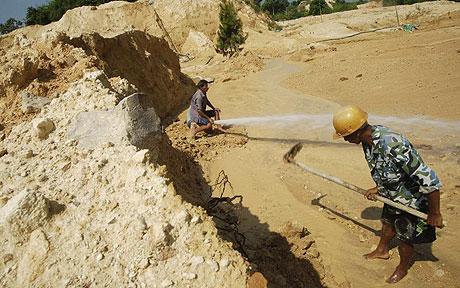
















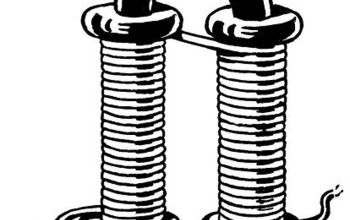
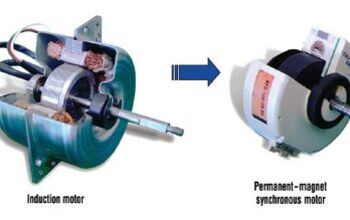
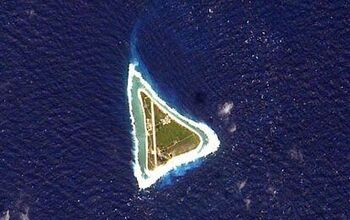
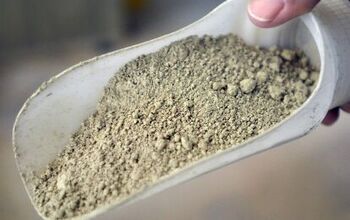
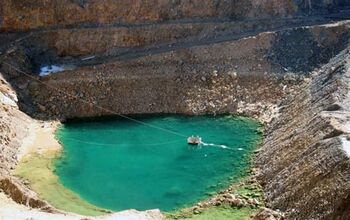










Comments
Join the conversation
Wholesale comments:
1.) Xinhua is owned by the Chinese government. People’s Daily is owned by the CCP. They are known in the trade as “semi-official” sources. They can be quoted when one wants to describe the (current) position of the Chinese government. I wouldn’t use them as a source to describe the position of a foreign government or company.
2.) Pearl Harbor: The NYT evoked Pearl Harbor. I think it’s tasteless, and it smacks of Hearst vintage “You provide the pictures, and I'll provide the war.” I’m in daily contact with Japan, and nobody in Japan was worried about the country going to its knees because of the (not so) rare dirt. They have enough in stock.
3.) Customs: As noted in the article, rare earth shipments weren’t the only shipments that were held up for a week or two. Pretty much all shipments to and from Japan received extra scrutiny, and everybody complained. This is a tried and true method in any trade spat. Actually, the Europeans used to be the experts. Suddenly, rules are enforced that had always been on the books, everything bogs down, but it’s not an "embargo" or an "import restriction." It’s a nuisance, and an insidious and effective trick: The consignee often has taken possession (if it’s F.O.B. export port) and now it’s stuck in customs. Charges for chartered bulk ships or containers mount. With import quotas, it can be even more insidious: You import something to your country, you paid for it, it’s been on the water for 4 weeks, and customs in your country suddenly tells you “sorry, quota exhausted, it won’t come in.” Now you have to ship it elsewhere at your cost and try to get your money back. Can’t even complain, because them’s the rules. Anyway, coming back to China and Japan, (all stuff) was stuck for around 10 days, then materials began to flow again. My (Japanese) wife designs (Japanese) handbags, and I have them made in China for her. Bags and materials were affected as well
4.) Export and import quotas: Are set by governments. As for export quotas, there even is an acronym fro it, “VER”, as in “voluntary export restraint.” One of the most famous in our circles: The auto VER by Japan in the 80s. Wasn’t quite “voluntary,” and we all know how it backfired. Basically, if we don’t want the stuff, an export quota is highly desirable. If we want the stuff, it’s an outrage. The U.S. maintains a long list ( Commerce Control List) of stuff the U.S. doesn’t want to export at all, or only in a highly controlled environment. This is often forgotten
5.) “Right after we arm the average Chinese and see what happens…” This is exactly what the Chinese are afraid of. Here is a country that has a history of being invaded for thousands of years. The same country (AFAIK) invaded nobody. They also don’t run around trying to export their ideology. Due to thousands of years of bad experience, they are sensitive about their borders and their people being armed by outside parties. Threaten their borders or their internal security, and they get very uptight. McArthur and the Russians learned that lesson, and that was when China was much weaker than now. Please revisit that lesson with an open mind before rattling sabers.
6.) Free trade ending all wars: No need to go back to 1914. Kindly look at the EU. Here are countries that had been at each others throats throughout history. Now they have a common currency, common rules. Can't even mass armies at their borders, because nobody knows anymore where the borders are. It's a club everybody wants to join. Nothing will ever end all wars. But trade is the best prevention. As long as you buy and sell, you don't want to kill your buyer or supplier.